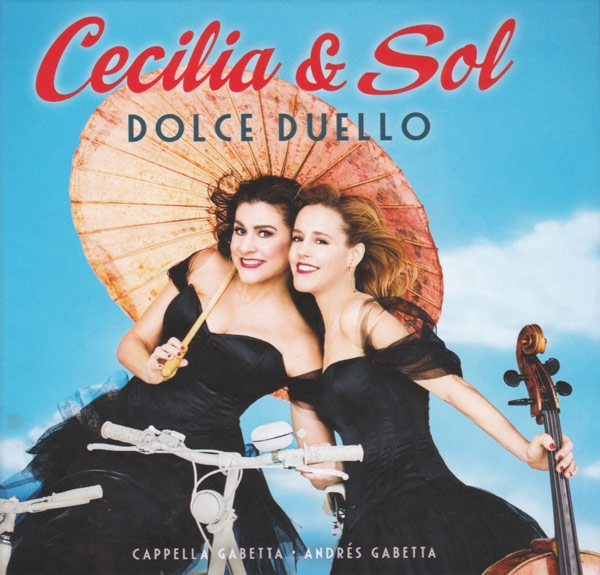| Columns Retired Columns & Blogs |
$29 for the CD and the 2496 files from HD tracks seems reasonable for $21, doesn't it.

Nor does the album consist solely of baroque arias. After extended pieces by Albinoni, Gabrielli, Vivaldi, Handel, Caldara, and Porpora—the longest, the world premiere recording of Caldara's "Fortuna e speranza" from the 1722 opera, Nitocri, lasts over 10 minutes—comes the icing on the cake, Sol Gabetta and her ensemble performing Boccherini's Cello Concerto No.10 in D, G483, from 1782.
Bartoli sounds wonderful. While she doesn't push her voice to the extremes heard in recordings from her mid-career prime, as exemplified by the 2007 album, Maria, and highs are voiced softly, her coloratura technique remains a wonder, and voice and vibrato are the epitome of steadiness. The sweet warmth of her unpressured instrument seems ideally suited to her repertoire, which was composed between 1687 and 1739, and contrasts well with Gabetta's thinner-sounding, gut-stringed Guadagnini cello.
One of the album's prime allures is the manner in which it pits Cecilia's rapid-fire, quasi-machine gun runs against Sol's smoother execution of same. Both women perform multiple technical wonders—Bartoli's long breathed lines remain a miracle—while Gabetta is tasked with even faster sprints and leaps. It's a lovely concept, and the blend of the two lighter-voiced instruments works.
Both women showcase their artistry in Caldara's above-referenced lament. Cecilia, ever the expressive artist, is complemented by Sol's affecting sound, and by her ability to maintain tension through silence. The sections where Sol holds forth solo above orchestral accompaniment are as compelling as Cecilia's rapt vocals.
When Cecilia really gets going, as she does in Albinoni's "Aure, andate e baciate" from one of many operas you've never heard of, Il Nascimento dell'Aurora, she's a wonder. She may not rip through the music, but that's not called for in an aria where Zephyr sends her breezes on a love mission. For hurricanes, you'll have to turn to another recording.
Each of the remaining pieces offers delights of its own. Gabrielli's beautiful, high lament elicits some fetching echo effects and a superb theorbo solo by Eduardo Egüez. Sol's playing is extremely exciting in Vivaldi's "Di verde ulivo" from Tito Manlio, and both women are the epitome of sweetness in "What passion cannot Music raise and quell!" from Handel's aptly titled Ode for St Cecilia's Day. Even Cecilia's fastest passages have a caressing warmth, which helps compensate for the fact that you'll be hard pressed to understand her attempt at English-accented English.
We could all use a generous helping of joy right now, of which you'll find plenty in the second world premiere recording of an aria by Caldara, "Tanto, e con si gran piena" from Gianguir, Imperatore del Mogol. To these ears, this aria's most intriguing duet between voice and cello makes it one of the finds of Cecilia's latest research. Equally rewarding is the way Cecilia invests the lightly voiced highs of Handel's "Son qual stanco pellegrino" from Arianna in Creta with touching sweetness, and the drop-dead gorgeous sounds she brings to the world premiere recording of an aria by Porpora.
Joy returns in abundance in the opening movement of Boccherini's Cello Concerto. Baroque composers loved to indulge in yearning, and we're treated to seven minutes of same, as well as measures of hushed silence and rare, refined beauty before the genial close. I have yet to hear the 24/96 hi-rez version of this album, but it undoubtedly offers yet one more reason why you baroque and Bartoli aficionados alike will want start off the year with Cecilia and Sol.

$29 for the CD and the 2496 files from HD tracks seems reasonable for $21, doesn't it.

ArkivMusic's $28.49 price is way out of line. The same deluxe edition is $16.95 on Amazon Prime. The HDTracks price is right in line with Acoustic Sounds, and less than ProStudioMasters by $1. Most of the download sites have been having New Year's sales, which are made available to those on their mailing lists.

I didn't buy it because I've literally run out of time to listen to the 50 or so similar albums I have in rotation on my player now. I don't know how you possibly get the time for all these, assuming that you'd want to have a second and third listen within a year of the first, but nevertheless, it's good to be able to sample these and know that someone is putting out first-rate recordings.